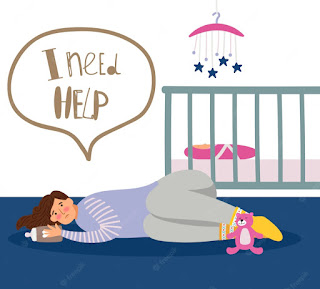Postpartum depression (PPD) is a form of depression that occurs in some women after giving birth. It is a complex and serious mental health condition that affects a woman’s emotional, physical, and social well-being. PPD typically occurs within the first few weeks after childbirth but can develop anytime during the first year.
Symptoms of postpartum depression can vary from mild to severe and may include:
- Persistent feelings of sadness, emptiness, or hopelessness.
- Loss of interest or pleasure in activities.
- Fatigue and lack of energy.
- Changes in appetite and sleep patterns.
- Difficulty concentrating or making decisions.
- Feelings of guilt, worthlessness, or excessive self-blame.
- Withdrawal from family and friends.
- Thoughts of harming oneself or the baby.
It’s important to note that many new mothers experience some degree of “baby blues,” which is characterized by mood swings, tearfulness, and anxiety in the first week or two after childbirth. However, if these symptoms persist and become more severe, it could indicate postpartum depression.
The exact causes of postpartum depression are not fully understood, but it is likely a combination of physical, hormonal, emotional, and social factors. Some potential risk factors for developing PPD include a personal or family history of depression, a difficult pregnancy or childbirth experience, lack of social support, and stressful life events.
If you or someone you know is experiencing symptoms of postpartum depression, it is essential to seek help and support. Treatment options for PPD may include therapy, support groups, medication, or a combination of these approaches. It’s crucial to involve healthcare professionals, such as doctors or therapists, who can provide an accurate diagnosis and develop an appropriate treatment plan.
Additionally, family and friends can play a vital role in supporting women with postpartum depression. Offering empathy, listening without judgment, assisting with household tasks, and encouraging her to seek professional help are all ways to support a woman experiencing PPD.
Remember, postpartum depression is a treatable condition, and with the right support and treatment, women can recover and enjoy a healthy and fulfilling life with their child.


[…] In short Insurance Guideline for Pregnancy– Pregnancy insurance, also known as maternity insurance, is a type of health insurance specifically designed to cover medical expenses related to pregnancy and childbirth. The main purpose of pregnancy insurance is to provide financial security and ensure that women receive good medical care during this important period of their lives.Pregnancy insurance generally covers a range of antenatal, antenatal, and postnatal expenses including doctor’s consultations, ultrasound scans, laboratory tests, hospital stays, delivery costs (normal and cesarean section), and postnatal care for mother and baby. Some policies may also cover complications during pregnancy or childbirth. […]